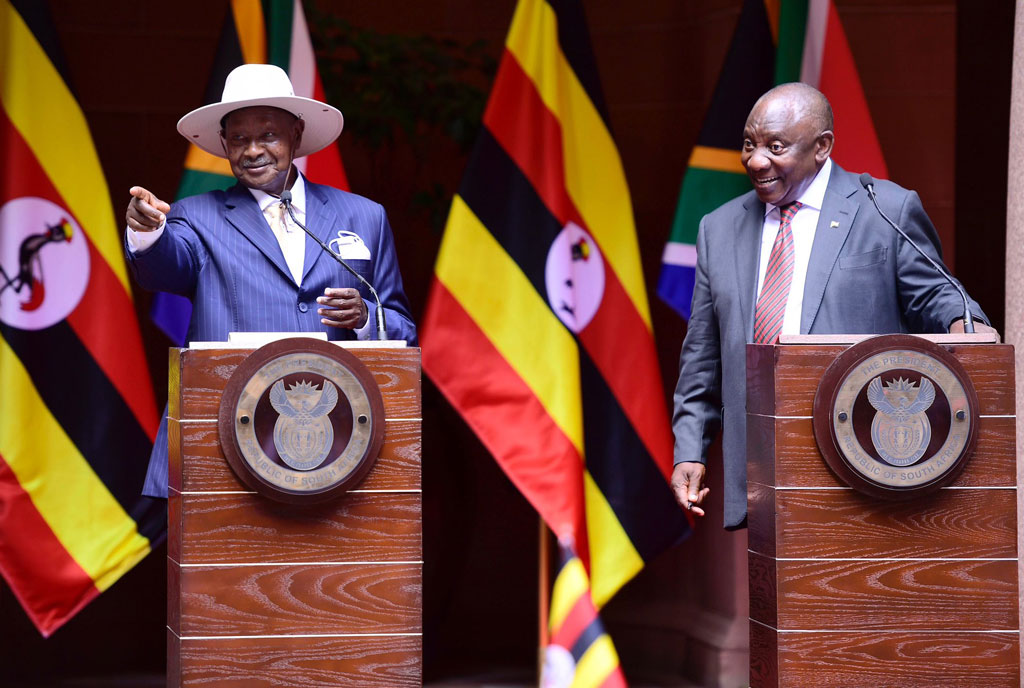Prime
South Africa’s president to visit Uganda for two-day working trip

Ugandan President Yoweri Museveni received by his South African counterpart, Cyril Ramaphosa upon his arrival in Pretoria on February 28, 2023. PHOTOS/ PPU
What you need to know:
- Since President Museveni’s visit to South Africa, there hasn’t been much progress to be seen on trade and investments as had been expected.
- The trade volume between the two countries has instead continued to drop.
- The number of South African companies has also reduced from 70 firms to just 35, according to the South African President.
- Currently, the trade volume between the two countries is US$130 million, but the leaders of the two countries want it to increase fourfold in five years’ time.
- The M23 rebels, a Tutsi-dominated armed group, that was once alleged to be backed by Uganda in 2013, attacked SADC forces leaving more than six soldiers from South Africa and Tanzania dead and several others injured.
The South African president is expected to start this two-day visit in Uganda tomorrow (Monday), months after his country sent troops under the Southern African Development Community (SADC) to fight M23 rebels in the eastern Democratic Republic of Congo.
Uganda’s Ministry of Foreign Affairs said President Cyril Ramaphosa’s visit was intended to strengthen ties between the two countries.
“His Excellency Cyril Ramaphosa, the President of the Republic of South Africa will undertake a two-day working visit to Uganda, from 15th-16th April 2024.The visit is aimed at strengthening the excellent bilateral relations between the Republic of Uganda and the Republic of South Africa,” a statement by the Minister of Foreign Affairs reads in part.
In February last year, President Museveni visited South Africa on a trip that was dominated by discussions on investment and the stability in the DRC.
Since President Museveni’s visit to South Africa, there hasn’t been much progress to be seen on trade and investments as had been expected.
The trade volume between the two countries has instead continued to drop. The number of South African companies has also reduced from 70 firms to just 35, according to the South African President. Currently, the trade volume between the two countries is US$130 million, but the leaders of the two countries want it to increase fourfold in five years’ time.
But on the Eastern DRC security, the war has intensified.
The SADC forces composed of South Africa, Malawians, and Tanzanians have deployed in eastern DRC to fight M23 rebels, a group that the United Nations alleged is funded and supported by Rwanda. Rwanda neither denies nor confirms that they are backing M23 rebels.
The deployment of SADC came after the DRC government refused to renew the mandate of East Africa Community Regional Forces in Eastern DRC.
The M23 rebels, a Tutsi-dominated armed group, that was once alleged to be backed by Uganda in 2013, attacked SADC forces leaving more than six soldiers from South Africa and Tanzania dead and several others injured.
President Ramaphosa and Tanzania President Samia Suluhu visited Rwanda where they discussed the Eastern DRC security with Rwanda President Paul Kagame last week.
President Kagame wants the Sadc to stop supporting the DRC government in the fight with M23 rebels, but President Ramaphosa said they would continue to help the DRC with military support as per their regional agreement.
During his visit to South Africa last year, President Museveni said they would work together with South Africa to solve the M23 rebels and Allied Democratic Forces security problem in Eastern DRC.
However, he made it clear that DRC President Felix Tshesekedi shouldn’t work with foreigners (western countries) and their backers, whom he called traitors.
“That is what I told Tshesekedi. ‘You Tshesekedi, are you on the side of the traitors or are you on the side of the freedom fighters? Because that is how they end up. They just come. They end up doing nothing. The first thing is that the traitors can’t build an army. No. They can’t build a national political party because they are sectarian. Tribes, and religion because of that they can’t build an army. So how can you have anything without an army, without a party?” President Museveni said.
President Museveni has been against the deployment of UN forces in Eastern DRC whom he often describe as tourists. South Africa and Tanzania are part of the UN forces in Eastern DRC.




